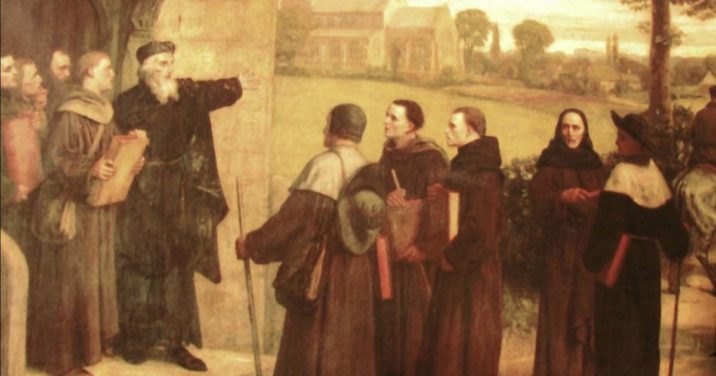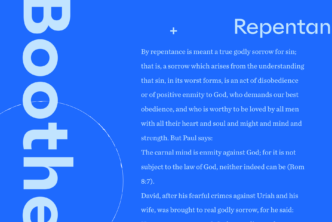You know about Martin Luther, John Calvin, and Ulrich Zwingli. You may even know about Thomas Cranmer and John Knox. . . .
But what do you know about the forerunners of the Protestant Reformation?
Learn how one pre-Reformer set the stage for Martin Luther in this lecture from Roger Olson, excerpted from the Logos Mobile Ed course Understanding the Protestant Reformation: Precursors and Legacy.
***
In historical theology, we have a particular category of people that we call pre-Reformers—that is, people who, before Luther and Calvin and other Protestant Reformers of the sixteenth century—actually believed much the same things. [Earlier in the course] I already mentioned one of them, Peter Waldo of the thirteenth century, perhaps the first Protestant and the founder of the first Protestant denomination that still exists, the Waldensian Church of Italy.
John Wycliffe
But another pre-Reformer, someone who believed many of the same things as Luther and Calvin, was John Wycliffe. We often know John Wycliffe’s name today because of the Wycliffe Bible Translators, but John Wycliffe was not himself a Bible translator. He encouraged translation of the Bible into the language of the people in his own country, which is England. However, it was his followers—the Lollards, as they were known—who began to translate the Bible into the vernacular, the language of the people.
Wycliffe’s life
John Wycliffe lived in the fourteenth century, dying in 1384. He was the leading theologian at the University of Oxford and belongs to the pre-Reformation Renaissance era, but he was not really a humanist as such. Some have called him the “Morning Star of the Reformation” because he openly taught many of the things that Luther himself taught in the sixteenth century, 200–300 years later. He was an English Protestant Reformer.
His life and career is interesting. He taught theology at Oxford University, but he was a strong critic of the papacy. And, of course, later, King Henry VIII broke away from the papacy and established an independent Catholic Church in England, and then, later, the Reformation reached England.
But . . . John Wycliffe’s ministry a couple of hundred years before . . . sets the stage for the Reformation in England. He talked Catholic theology but was also a harsh critic of many of the teachings of the pope in Rome and of the general practices of most Catholic priests and bishops. But he was protected by the English because he argued that the ruler of a country should have authority over the church in his country, and the English king of his time liked that idea and so protected him from the Inquisition.
John Wycliffe’s teaching
Papal supremacy
Wycliffe rejected papal supremacy. He did not believe that the bishop of Rome was infallible or had supremacy over other bishops or should have supreme authority over the Church of England. He also denied transubstantiation, which at that time could get you killed by the Inquisition. He was also against purgatory. He believed that true Christians went immediately into heaven and bypassed any such thing as purgatory, which he did not believe even existed.
Most importantly, perhaps, like Peter Waldo before him and Luther after him, he denied the salvific merit of good works.
Salvation by grace alone
The Catholic Church, of course, taught that salvation is by faith and works of love. Wycliffe disagreed and believed that salvation—our justification by God, our reconciliation and forgiveness—is on the basis of God’s grace alone and through faith alone and not on account of good works that we do, although he didn’t denigrate good works.
Authority of Scripture over tradition
Wycliffe advocated the unique authority of Scripture. He believed that Scripture stands above tradition, and anything not found in Scripture cannot be dogma of the church, cannot be necessary for salvation, and should not be enforced upon Christians. Later in the Reformation, this principle becomes sola Scriptura—Scripture alone, above tradition.
Priesthood of all believers
Wycliffe also believed in the priesthood of all believers. He believed that every true Christian—every person of a genuine Christian faith—should be able to go directly to God in prayer for themselves and for others and did not need priests as such. Though he believed that priests are important, their main job should be preaching the gospel.
Predestination
He believed in salvation by grace alone through faith but also believed in predestination. Those who have faith are predestined by God, and faith is a gift of God to them. So he prefigures Calvin in his belief about predestination.
Translations
He believed that the Scriptures should be translated into the language of the people—the vernacular—and his followers began to do that with his encouragement, which was not looked favorably upon by the Catholic Church of his time.
Considered an enemy of the Catholic Church
In many ways, Wycliffe was a Calvinist before Calvin and a Lutheran before Luther.
He founded a group of lay preachers whose job was to go around England translating the Bible into the language of the people and preaching the gospel outside the confines of the church—often in people’s homes, and secretly, because they could be persecuted for what they were doing.
They came to be known as the Lollards, and we don’t even know exactly what that word means. But they traveled around England preaching and organizing small congregations mostly in homes, but sometimes meeting in forests outside the authority of the Catholic Church. Many of them were arrested and killed. Wycliffe himself was protected during his lifetime by the king of England, but when he died he was declared a heretic by the Church, and eventually, his body was dug up and burned and his ashes scattered in a river 25 years after his death as a symbol of how much the Church hated him because of his reforming ideas.
***
Related resources
- The Five Solas: Courses and Study Pack
- Romans (Hendriksen & Kistemaker New Testament Commentary | HK)
- The Reformation for Armchair Theologians
- Institutes of the Christian Religion (2 vols.)
- Martin Luther on the Bondage of the Will to the Venerable Mister Erasmus of Rotterdam







